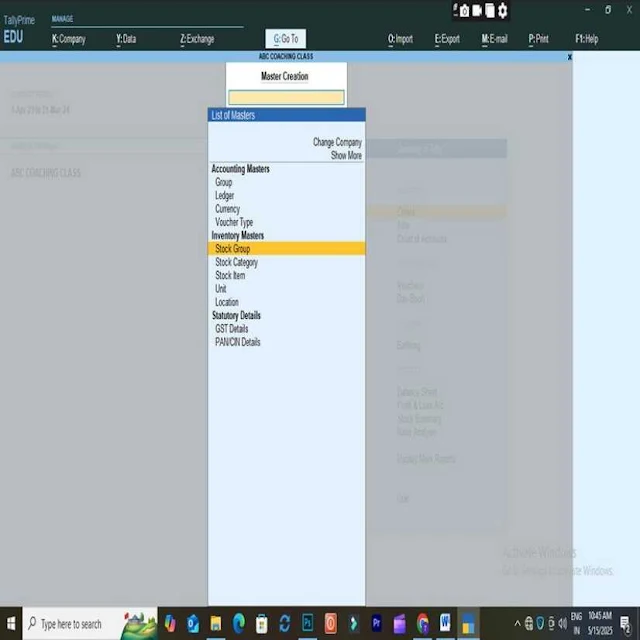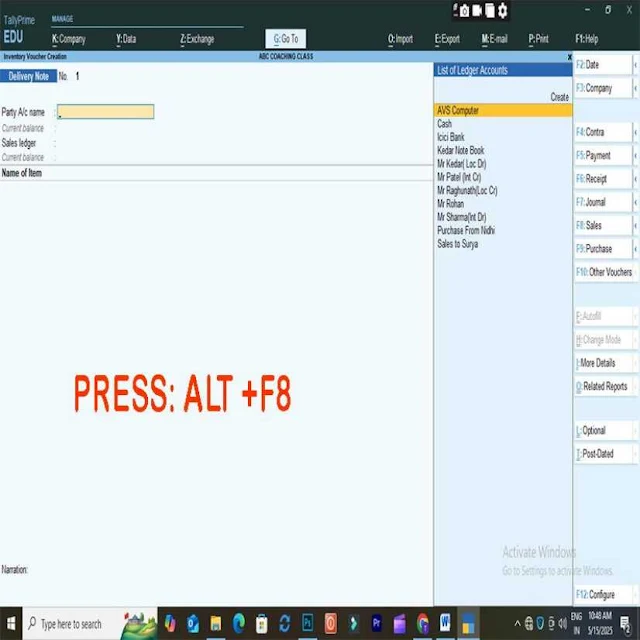Tally Prime is one of the most powerful business management software solutions used by companies for accounting, inventory, payroll, taxation, and other financial needs. Among these, Inventory Management plays a crucial role in tracking stock, managing goods, controlling wastage, and maintaining business efficiency.
This article delves deep into the concept of Inventory in Tally Prime, covering everything from basics to advanced features, with practical examples for better understanding.
Introduction to Inventory in Tally Prime
Inventory in Tally Prime refers to the systematic management of stock items such as raw materials, finished goods, spare parts, etc., across different stages of business. Tally provides tools to monitor inventory flow, track stock movement, value inventory, and generate meaningful reports.
Importance of Inventory Management
- Proper inventory management in Tally Prime helps businesses in:
- Maintaining optimal stock levels
- Preventing overstocking and stockouts
- Enhancing order management
- Reducing carrying costs
- Streamlining purchase and sales cycles
- Accurate reporting and analysis
Features of Inventory in Tally Prime
- Tally Prime offers robust inventory features:
- Multiple stock groups, categories, and items
- Batch and expiry date tracking
- Location/Godown-wise inventory
- Units of measurement
- Multiple valuation methods
- Inventory reports like Stock Summary, Movement Analysis, etc.
- Job Work and Manufacturing tracking
Stock Groups
Stock Groups help categorize similar inventory items.
Example:
A company deals in electronics. Stock groups can be:
- Televisions
- Mobile Phones
- Laptops
- Creating Stock Group:
Gateway of Tally → Create → Inventory Masters → Stock Group
Stock Categories
Stock Categories provide alternative classification to stock groups for analyzing stock across different characteristics.
Example:
If Mobile Phones are stock items, categories could be:
- 4G
- 5G
- Dual SIM
Stock Items
Stock Items represent the actual products stored or sold.
Example:
Under Mobile Phones group, stock items can be:
- Samsung Galaxy A13
- iPhone 13
- Redmi Note 11
Creation:
Gateway of Tally → Create → Stock Item
Units of Measure
Units define how inventory is measured.
Types:
- Simple Units: Pcs, Kgs, Ltrs
- Compound Units: Dozen (12 Pcs), Tonnes (1000 Kg)
Create Units:
Gateway of Tally → Create → Units of Measure
Godowns (Locations)
Godowns represent storage locations.
Example:
- Warehouse – Delhi
- Store – Mumbai
Create:
Gateway of Tally → Inventory Masters → Godowns
Creating Inventory Masters
Step-by-Step:
- Stock Group: Create groups like "Televisions", "Accessories"
- Stock Category: Create categories like "LED", "Smart"
- Units of Measure: Define units as "Pcs", "Box"
- Godowns: Define locations
- Stock Item: Create items with linkage to group, category, and unit
Inventory Vouchers in Tally Prime
Tally Prime offers various vouchers for stock transactions:
- Receipt Note
- Delivery Note
- Rejection In
- Rejection Out
- Stock Journal
- Physical Stock
- Enable Inventory Vouchers:
Gateway of Tally → F11: Features → Inventory Features
Read: Voucher Types in Tally Prime
Delivery Note
Used when goods are delivered to customers.
Example:
Company delivers 10 iPhones to XYZ Ltd.
Steps:
Gateway of Tally → Voucher
Select "Delivery Note"
Enter Party Name, Date, and Stock Item Details
Receipt Note
Used when goods are received from suppliers.
Example:
Received 100 units of LED TV from ABC Suppliers.
Steps:
Voucher Entry → Receipt Note
Enter Supplier Name and Stock Details
Rejection In and Rejection Out
Rejection In: When customer returns goods
Rejection Out: When goods returned to supplier
Example:
10 defective phones returned by customer → Rejection In
Stock Journal
Used for internal stock transfers, adjustments, and manufacturing.
Example:
Raw material to Finished Goods conversion
Transfer 20 units from Godown A to Godown B
Physical Stock Voucher
Used to record actual physical stock count.
Example:
System shows 100 units, physical count shows 95 units. Adjust using Physical Stock Voucher.
Bill of Materials (BoM)
Used in manufacturing to define components required to make a product.
Example:
To manufacture 1 Computer:
1 CPU
1 Monitor
1 Keyboard
Steps:
Enable BoM
Link components to finished product
Batch-wise and Expiry Date Management
Track items based on batches and expiry.
Example:
Medicine stock:
- Batch No: M123
- Expiry: 12/2025
- Enable in Inventory Features.
Price Levels and Price Lists
Used to define different pricing for different customers or quantity levels.
Example:
Dealer Price: ₹9,000
Retail Price: ₹10,000
Bulk Price: ₹8,500 (if buying >10)
Enable:
Gateway of Tally → F11 → Enable Multiple Price Levels
Read: Price Level and Price List in Tally Prime
Inventory Reports
Key inventory reports:
- Stock Summary
- Movement Analysis
- Stock Item Report
- Godown Summary
- Stock Ageing Analysis
- Batch-wise Report
- Useful for decision-making and inventory control.
Inventory Configuration in Tally Prime
Customize stock settings:
- Alternate units
- Standard rates
- Item-wise tax details
- Zero value entries
Navigate:
Gateway of Tally → F12: Configuration → Inventory Info
Inventory Features (F11)
- Activate inventory features like:
- Multiple Godowns
- Batch-wise Details
- Manufacturing Journal
- Reorder levels
- Access: Gateway of Tally → F11
Inventory with Accounting Integration
Inventory can be integrated with accounting for automatic entry of stock value into financial books.
Example:
Purchase of 50 units auto affects stock and Purchase A/c
Can be enabled or disabled based on business preference.
Read: What is Accounting Cycle?
Inventory Valuation Methods
Tally supports multiple valuation methods:
- FIFO
- LIFO
- Average Cost
- Last Purchase Cost
- Standard Cost
- At Zero Cost
Set under:
Gateway of Tally → Stock Item → Valuation Method
Examples and Use Cases
Example 1: Electronics Store
- Stock Group: Mobiles
- Stock Item: OnePlus Nord CE
- Unit: Pcs
- Receipt Note: 100 Units from Supplier
- Delivery Note: 20 Units sold
- Report: Stock Summary → 80 Units Available
Example 2: Pharma Company
- Enable Batch-wise tracking
- Enter expiry dates
- Maintain pricing for bulk purchase
- Generate Ageing Report
Example 3: Manufacturing Unit
- Use BoM to define raw material to finished product
- Use Stock Journal for internal transfers
- Physical Stock for periodic stock audit
Summary and Conclusion
Inventory management in Tally Prime is a robust and flexible system that helps businesses of all sizes handle their stock efficiently. From basic tracking of items to advanced features like batch management, manufacturing journals, and price lists, Tally provides all the tools needed for effective inventory control.
Key Takeaways:
- Set up inventory masters correctly before recording transactions
- Use inventory vouchers for real-time stock tracking
- Customize inventory features as per business needs
- Integrate inventory with accounting for seamless data flow
- Use reports to make data-driven decisions
Whether you are a retailer, wholesaler, or manufacturer, mastering inventory in Tally Prime can significantly improve operational efficiency and decision-making.
Also Read:








.jpg)










0 Comments